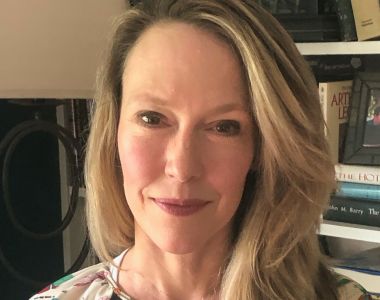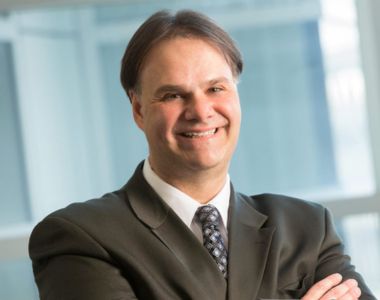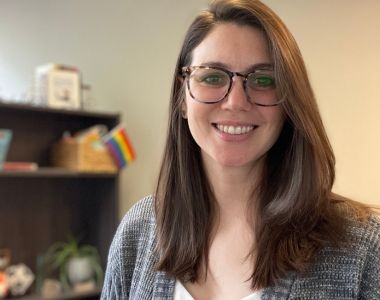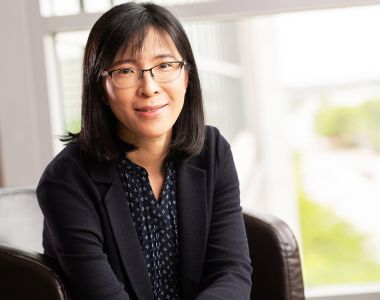Across disciplines at Case Western Reserve University, faculty members play critical roles in supporting graduate students as they prepare for the next stage of their academic and professional careers.
Whether they provide enlightening advice or help a student navigate a complicated subject, faculty members facilitate success on the graduate level.
The John S. Diekhoff Awards for Excellence in Graduate Teaching and Mentoring recognize faculty members who go above and beyond in these roles. Each year, a committee of students in the School of Graduate Studies selects four recipients “who make exemplary contributions to the education and development of graduate students.”
This year, three faculty members were honored for their mentorship and one for teaching. Read more about them below.
John S. Diekhoff Awards for Excellence in Graduate Teaching

Jacqueline Curtis
Associate Professor, Department of Population and Quantitative Health Sciences
When it comes to her teaching philosophy, Jacqueline Curtis credits individuals throughout her life with shaping her approach. This includes her mother and first mentor, various educators who fostered her sense of belonging and, most recently, her neurodiverse child for revealing different pathways to positive student outcomes.
Now, the associate professor in the Department of Population and Quantitative Health Sciences will receive the John S. Diekhoff Award for Graduate Teaching. Curtis said receiving the award is both an honor and a challenge.
“I am honored that my students think this highly of my work,” said Curtis. “However, I also feel challenged to be more reflective of exactly what it means to be an excellent teacher so I can continue growing and share what has worked for me and my students.”
Curtis said teaching success requires acknowledging and respecting the value of differences in others, setting aside preconceived ideas, listening deeply and being committed to open-mindedness and creativity.
“I feel assured that my voice will be heard, and she treats all students in this respectful way,” said a student nominator.
As a spatial epidemiologist, Curtis teaches the course “Introduction to Geographic Information Systems (GIS) for Health & Social Sciences,” serves as a guest lecturer and advisor and holds the position of Block 1 Inquiry Facilitator for MD students.
“I always start each term by telling students that their differences make a difference in the best possible way,” she said.
Curtis recognizes the privilege of her positive academic experiences and finds opportunities to pay it forward.
“As a teacher, I believe my relationship with and responsibility to my students is for life, not just for a semester or for a few years, “ said Curtis.
A student nominator has experienced this dedication firsthand.
“I took her class during the pandemic and she made time to regularly meet with each student outside of class time virtually, to not only ensure our projects were going okay, but also just to check in and see how we were doing as people,” the nominator said.
Curtis said the most exciting part of mentoring students is seeing them transform in confidence, overcome imposter syndrome and shine in ways they never thought possible.
“It demonstrates the transformative power of education and shows the promise that is in all people when they are encouraged and supported,” she said.
John S. Diekhoff Awards for Excellence in Graduate Teaching and Mentoring

Philip A. Cola
Winkle Healthcare Management Professorship at Weatherhead School of Management; associate professor, School of Medicine
In an office tucked away on the third floor of the Peter B. Lewis Building, a bookshelf behind Philip Cola’s desk stands as a physical testament to academic curiosity. It’s furnished with meticulously arranged binders spanning nearly 8 feet—each containing a trove of unfinished research. These files serve not only as a repository of knowledge—much of it related to organizational behavior and workforce development in the translational sciences—but also as a springboard for the dynamic discussions in his classroom.
Because Cola, the Winkle Healthcare Management Professor at Weatherhead School of Management, makes a point to continue to learn and grow with his students.
“I don’t want to be someone who lives in an ivory tower,” he said. “I want to engage my students with this research. I like being a support system for them. If you’re a good mentor, you learn as much from them as much as they learn from you. It keeps me young. One thing I’m not going to do: I’m not going to think about things the way I’ve always thought about them.”
Cola’s enthusiasm for his students and his craft earned him the 2021 John S. Diekhoff Award for Distinguished Graduate Teaching. And now, Cola, who also holds an appointment at the School of Medicine, will receive the 2024 John S. Diekhoff Award for Graduate Mentoring. The nomination letters from colleagues and students noted his ability to “prepare,” “encourage,” “empower,” “empathize” and “communicate”—in and outside the classroom.
“Dr. Cola possesses a rare combination of strengths matched by his ability to make complex scholarly concepts accessible with a genuine commitment to students’ growth, both academically and personally,” one wrote.
Those binders of research? Cola said they represent the type of bond he builds learning along with his students.
“It’s the idea of forming relationships, I call them bi-directional, because it’s a two-way street,” he said. “Whenever you’re able to do that, the interactions with relational capacity are deeper and richer, so I’m really trying to live that.”
After 20 years in private industry, Cola pursued what he remembers as the “most difficult professional decision that I had to make in my life:” leaving his executive-level career as vice president of research at University Hospitals to follow his passion to become a professor at his alma mater. Now, Cola uses his teaching to help students achieve the same types of life-changing experiences.
“I love doing what I do,” he said. “I really believe that I have the best job in the world.”

Christine E. Duval
Assistant Professor, Department of Chemical and Biomolecular Engineering
Christine Duval’s favorite thing about mentoring students is the moment when they become the experts.
“It’s really special to take in these students who start off at square one and help them figure out what they want to do with their lives, how to become independent thinkers and all of those skills that extend beyond the laboratory,” she shared.
It’s the reason she chose academia. Working with students and watching them succeed is what gives her “all the warm fuzzies of the job.”
Now, Duval, an assistant professor of chemical engineering in the Department of Chemical and Biomolecular Engineering, will be honored with the John S. Diekhoff Award for Graduate Mentoring, a recognition she says “means everything” to her.
There are a few core values Duval maintains in her lab to ensure success for her students. Most important is cultivating a welcoming lab environment—on both a personal and scientific level.
“When people are uncomfortable sharing or asking questions, it holds up science,” she said.
By setting expectations early on, Duval helps her students understand they don’t need to know everything right away and that the learning will happen over time.
“Our research group is a team,” she said. “Everyone was a beginner at some point and we should expect that any questions are asked in good faith with the goal of learning from each other.”
Students excel in this environment—and they point to Duval’s ongoing support of both their academic pursuits and career goals even after leaving her lab. Knowing their journeys to earning degrees could take as long as five years, Duval personalizes each student’s experience, providing resources for whatever path they are inspired to take.
“I tell incoming graduate students that they cannot find a better advisor than Dr. Duval,” one nominator wrote. “She made my graduate school experience one that I am extremely grateful for and if given the opportunity I would do it all again.”
For Duval, the feelings are mutual.
“Every semester I learn something new from the graduate students,” she said. “They’re constantly pushing the boundaries of their own knowledge and help me do the same.”

Xin Qi
The Jeanette M. and Joseph S. Silber Professor of Brain Sciences, Department of Physiology and Biophysics
Proactive communication and an innate desire to help guide students through their academic journeys are at the heart of Xin Qi’s mentoring style. Qi, the Jeanette M. and Joseph S. Silber Professor of Brain Sciences at the School of Medicine, fosters collaborative research, student success and professional confidence in an atmosphere that allows for the seamless exchange of information through regular one-on-one meetings and an open-door policy.
For Qi, mentoring has always been the cornerstone of her academic philosophy—one that’s now earned her the 2024 John S. Diekhoff Award for Graduate Mentoring.
“It’s about guiding students—not just in their research, but shaping their future careers and aspirations in science,” she said. “This award is a profound recognition not only of my efforts but also of the fundamental value of mentorship in academic growth and success.”
One nominator said Qi creates an open and inclusive environment where everyone feels comfortable sharing progress, concerns and ideas. She appreciated how Qi helped her break down projects into manageable steps and provided guidance on setting realistic deadlines during a particularly overwhelming period.
“With her support and encouragement, I was able to develop a structured approach to my workload, ultimately overcoming the hurdle and achieving a better balance between my academic and personal commitments,” the nominator said.
Qi said her mentees need different types of support as they progress academically.
“It begins with regular meetings, goal setting and developing research plans in the early stages, to dissertation writing, conducting mock defenses and exploring career paths in the later stages,” Qi said.
Student nominators said she has an infectious drive and high expectations for herself and the lab.
“A major way she measures her success is through the advancements of her trainees, “ said another nominator. “She is truly our biggest supporter and I couldn’t be more grateful for her continued support.”
Qi will celebrate the award win with lab members and graduate students, thanking them for their roles in her journey.
“Mentoring is as much about learning as it is about teaching, and I have learned tremendously from them,” she said.

